Have you heard of mucoid plaque? This sneaky mucous can build up in your digestive tract and potentially inhibit nutrient absorption and impede gut health. Don't worry, we've found a helpful tool to detox and improve gut health: Try the mucoid plaque cleanse recipe. Learn all about mucoid plaque, how to prevent it, and how to remove it!
Jump to:
In an age where processed foods, environmental toxins, and stress dominate our daily lives, it is crucial to recognize the impact these factors can have on our digestive system.
The accumulation of mucoid plaque, a sticky substance that coats the walls of our intestines, is one such consequence that deserves our attention.
While conventional medicine may overlook the significance of mucoid plaque, holistic nutrition and wellness practitioners understand that it can play a pivotal role in the complex web of our health.
By delving into the origins, symptoms, and potential impact of mucoid plaque on the body and colon health, we can better comprehend how it can affect our vitality and well-being.
Disclaimer
This article is designed for informational purposes only. It is not meant to replace medical advice. As a Holistic Nutrition Specialist, I follow trends in nutritional studies and intend to share information to help one become an active participant in their own unique health journey. Always remember, before performing any type of colon cleanse or making any changes to your healthcare routine, be sure to consult with qualified medical professionals. This is especially so if you have a health condition or are taking medications. We recommend working with a functional medical doctor who is well-versed in holistic nutrition principles.
What is Mucoid Plaque?
The term mucoid plaque is used to describe a thick, gelatinous substance that can accumulate in the gastrointestinal tract, particularly in the large intestine and lining of your colon.
This digestive plaque is often believed to be a result of a combination of factors, including poor dietary choices (common in a modern diet), inadequate fiber intake, and a sedentary lifestyle.

The formation of mucoid plaque begins when the body's natural protective mechanisms within the digestive system become compromised.
Over time, the lining of the intestines can become congested with various substances such as undigested food particles, mucus, toxins, and waste materials.
These substances may adhere to the intestinal walls, creating a sticky, rubbery substance that is commonly referred to as a mucoid plaque.
It can even coat your tongue and travel all the way through your entire digestive system.
While the existence and exact composition of mucoid plaque are debated in conventional medical circles, proponents of holistic health believe that this buildup can impede proper nutrient absorption, hinder the elimination of heavy metals and other toxic substances, disrupt the gut microbiome, and contribute to various digestive issues.
It is thought to obstruct the natural functioning of the intestines, potentially leading to symptoms such as bloating, constipation, fatigue, brain fog, inflammatory bowel disease, and even a compromised immune system.
What Causes Mucoid Plaque?
The accumulation of mucoid plaque can be a result of dietary and lifestyle factors, including a high intake of processed foods, refined sugars, unhealthy fats, and insufficient fiber.
Additionally, chronic stress, lack of physical activity on a regular basis, and exposure to environmental toxins can also contribute to its formation.
Keeping a Healthy Gut
Holistic nutrition specialists emphasize the importance of maintaining a healthy digestive system by promoting a nutrient-dense diet, regular physical activity, stress management techniques, and detoxification practices.
By addressing the underlying causes of mucoid plaque formation, it is believed that one can support the body's natural detoxification processes and restore optimal digestive function.
Impact of Mucoid Plaque
Mucoid plaque is often associated with a range of symptoms and health implications. While individual experiences may vary, understanding the potential impact of mucoid plaque on digestive and overall health can shed light on the importance of addressing this buildup.

Impaired Nutrient Absorption
Mucoid plaque can create a protective layer or barrier between the intestinal lining and the nutrients present in food. There is a concern that it may hinder the absorption of essential vitamins, minerals, and other nutrients, leading to potential deficiencies and compromised overall health.
Digestive Issues
The presence of mucoid plaque is believed to disrupt the natural flow of digestion and elimination processes.
It may contribute to symptoms such as bloating, gas, abdominal discomfort, irregular bowel movements, irritable bowel syndrome, leaky gut syndrome, and even chronic constipation.
Although there is insufficient evidence and a lack of sufficient scientific research, it is also believed that diseases such as ulcerative colitis, Crohn's disease, and even colon cancer stem from the throes of poor diet and the mucoid plaque that results from it.
Toxin Accumulation
The buildup of mucoid plaque may hinder the elimination of toxins from the body.
When the intestinal walls are congested, toxins and waste materials may linger within the digestive system for longer periods, increasing the body's toxic burden.
Reduced Colon Function
Excessive mucoid plaque is often associated with compromised colon function.
The colon plays a vital role in eliminating waste products from the body. When the colon is burdened with mucoid plaque, its ability to efficiently perform its elimination function may be impaired, resulting in further stagnation and health consequences.
The accumulation of waste matter from the inability to have a regular bowel movement can result in feelings of heaviness, sluggishness, and a general sense of discomfort.
Weakened Intestinal Flora
The presence of mucoid plaque can create an environment that is less conducive to a healthy balance of friendly bacteria in the gut.
A healthy gut flora is crucial for proper digestion, nutrient absorption, and overall immune function. Disruption of the gut microbiome can contribute to imbalances and increase the risk of digestive disturbances and other health issues.
The walls of your colon become a breeding ground for harmful bacteria.
Addressing Mucoid Plaque
To support digestive health and address mucoid plaque, a holistic approach is often recommended.
This approach involves adopting a healthy diet and making lifestyle changes that promote optimal digestion and detoxification. Here are some key strategies:
Fiber-Rich Diet
Including a variety of fiber-rich foods such as fruits, vegetables, whole grains, and legumes can help promote regular bowel movements and prevent constipation.
Fiber acts as a natural broom, helping to sweep away waste materials from the walls of the colon and aid in the removal of mucoid plaque.
Hydration
Staying adequately hydrated is essential for maintaining healthy digestion.
Drinking sufficient water throughout the day can help soften the stool, promote regular bowel movements, and support the elimination of waste materials, potentially including mucoid plaque.
Probiotics
Introducing beneficial bacteria through probiotic-rich foods or probiotic supplements can help restore a healthy balance of gut flora.
The good bacteria help to fight off bad bacteria creating a balance called the microbiome.
Probiotics support optimal digestion, nutrient absorption, and immune function, aiding in the removal of mucoid plaque and promoting overall digestive wellness.
 Klaire Labs SFI Health Ther...Shop on Amazon
Klaire Labs SFI Health Ther...Shop on Amazon
Detoxification Practices
Incorporating detoxification practices, such as periodic cleansing protocols or supporting liver function, may aid in the removal of toxins and waste materials, including mucoid plaque.
These practices should be undertaken under the guidance of qualified healthcare professionals or holistic nutritionists.
 Liver Cleanse Detox & Repai...Shop on Amazon
Liver Cleanse Detox & Repai...Shop on Amazon
Stress Management
Chronic stress can have a significant impact on digestive health. Incorporating stress management techniques such as meditation, deep breathing exercises, regular physical activity, and sufficient rest can help promote a healthy gut-brain connection and support optimal digestion.
Colonic Irrigation
Colon irrigation, also known as colon hydrotherapy, is a procedure that involves gently flushing the colon with warm water to remove accumulated fecal matter, waste, and toxins.
It is believed to promote detoxification, improve digestion, relieve constipation, and support overall colon health.
Cleanse Ingredients
In this natural mucoid plaque remover recipe, each ingredient serves a specific purpose in potentially supporting the removal of toxins and plaque while promoting a healthy colon. Here are the ingredients and their individual purposes:
Organic Psyllium Husk Powder
Psyllium husk is a soluble fiber that absorbs water and forms a gel-like substance in the colon. It helps add bulk to the stool, promotes regular bowel movements, and aids in the removal of waste materials, potentially including mucoid plaque.
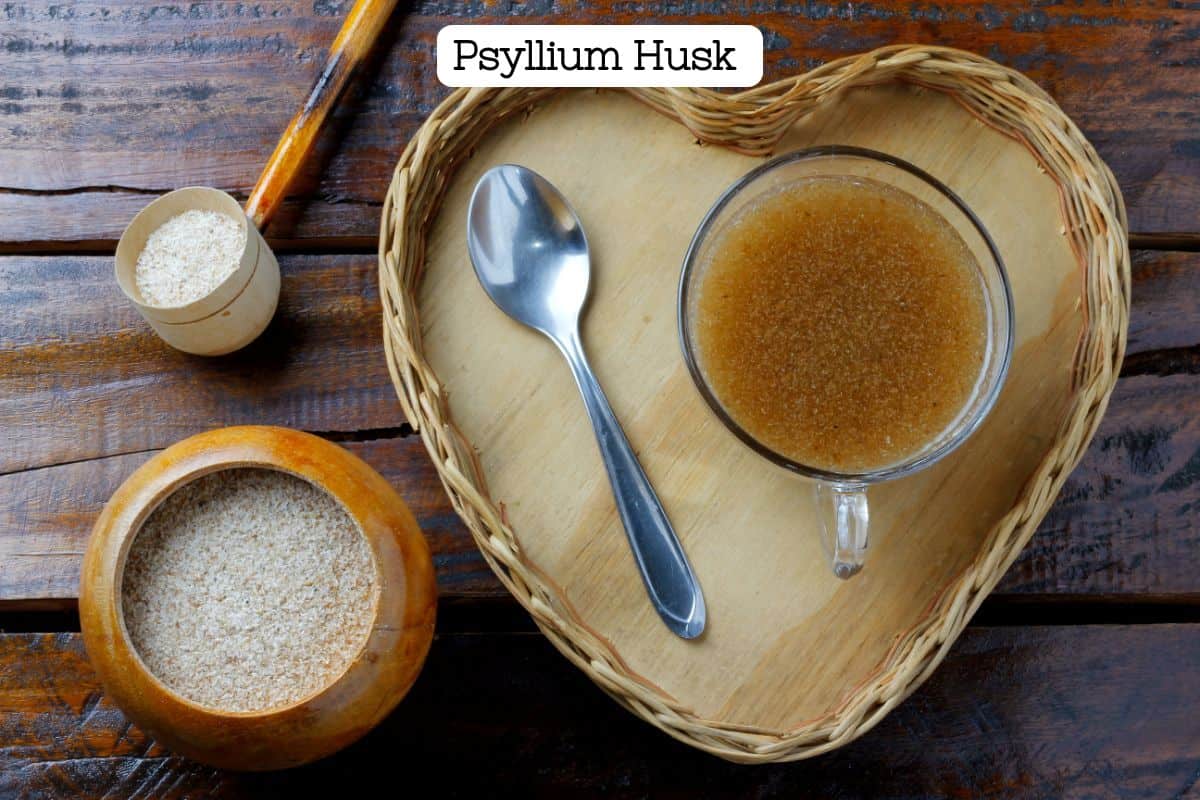
Bentonite Clay
Bentonite clay is a natural clay known for its ability to bind to toxins, heavy metals, and harmful bacteria. In the context of mucoid plaque cleansing, it assists in removing accumulated waste and impurities from the colon.

Freshly Squeezed Lemon Juice
Lemon juice is rich in vitamin C and has alkalizing properties. It helps stimulate digestion, supports liver function, and promotes a healthy pH balance in the digestive system.
Organic Raw Honey (Optional)
Honey is a natural sweetener that provides additional antimicrobial properties. Its inclusion in the recipe can help balance the taste while potentially offering some additional health benefits.
Pure Water
Water is essential for proper hydration and helps soften the stool, facilitating regular bowel movements and the elimination of waste matter, including mucoid plaque. Spring water is ideal!
By combining these ingredients, this cleanse recipe aims to create a gel-like mixture that can assist in the removal of accumulated waste materials, support healthy bowel movements, and potentially promote a cleaner, healthier colon.
Remember to follow the recipe instructions and consult with healthcare professionals if you have any underlying medical conditions, food allergies, or concerns.
Important Notes
Do NOT use more than recommended. Bentonite clay and psyllium husk expand because they are both highly absorbent. A little bit goes a long way.
Be sure to drink plenty of water to ensure it is flushed through your digestive tract.
Too much of either has the potential to cause intestinal obstructions. Also, be sure sure to take this drink within 2 hours before or after taking any medications or supplements.
It may cause the medications to be ineffective.
 Himalaya Organic Psyllium H...Shop on Amazon
Himalaya Organic Psyllium H...Shop on Amazon
 Calcium Bentonite Clay Heal...Shop on Amazon
Calcium Bentonite Clay Heal...Shop on Amazon
Important Steps to Using the Cleanse
Preparation
Ensure that you have all the ingredients for the mucoid plaque cleanse recipe: organic psyllium husk powder, bentonite clay, freshly squeezed lemon juice, organic raw honey (optional), and filtered water. Have a glass or jar and a spoon ready for mixing.
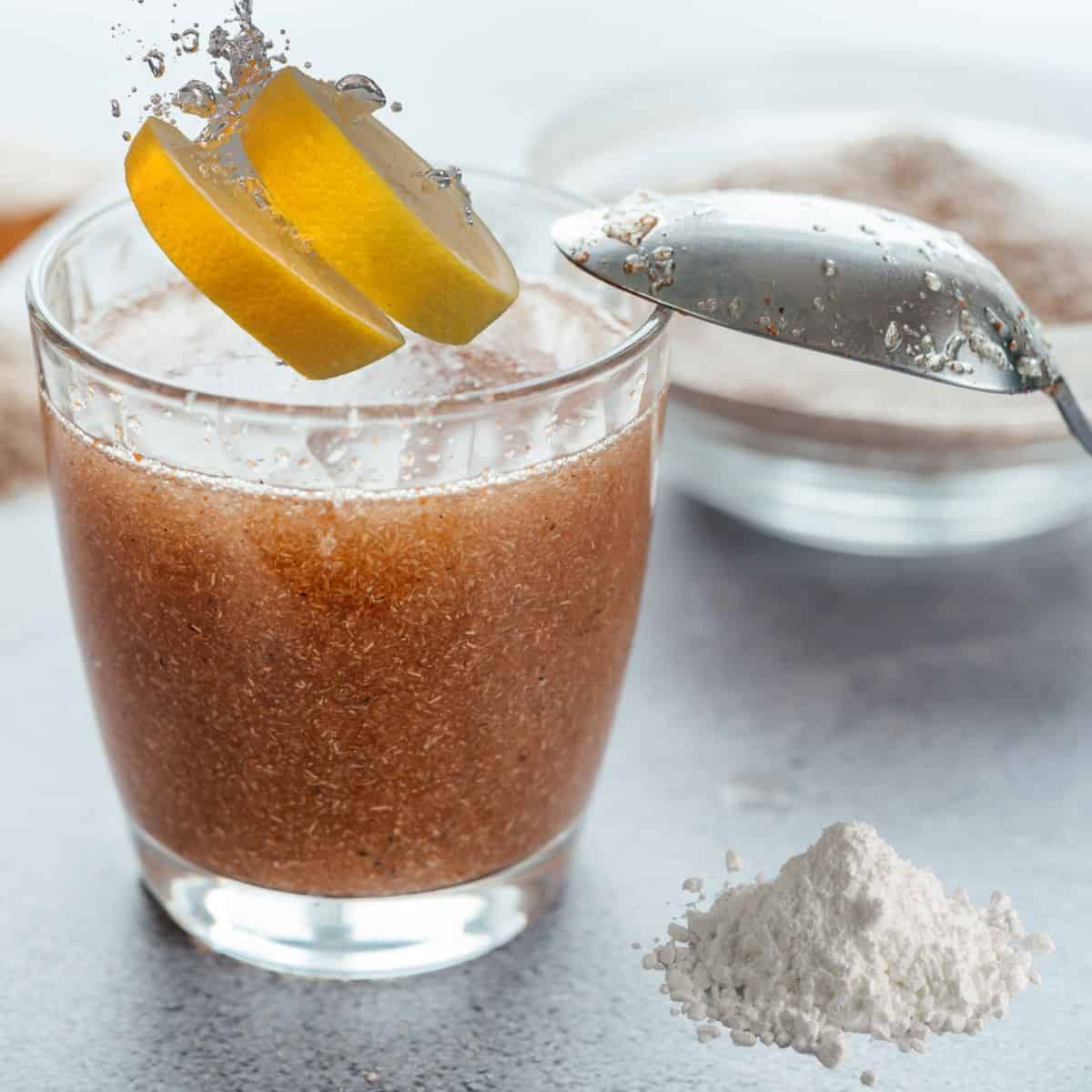
Mix the Ingredients
In a glass or jar, combine 1 tablespoon of organic psyllium husk powder and 1 tablespoon of bentonite clay. Add 1 tablespoon of freshly squeezed lemon juice and 1 teaspoon of organic raw honey if desired. Stir the mixture well to ensure all the ingredients are thoroughly combined.
Drink Immediately
Once mixed, drink it promptly. It is recommended to take the mucoid plaque cleanse on an empty stomach, preferably in the morning or before bedtime. Follow it with an additional 8 ounces of filtered water to ensure proper hydration.
Stay Hydrated
Throughout the day, make sure to drink plenty of water to support hydration and the movement of the cleanse through your digestive system. Adequate hydration helps soften the stool and aids in the elimination of waste materials.
Monitor Your Body's Response
Pay attention to how your body responds to the mucoid plaque cleanse. Everyone's experience may vary. Some individuals may notice increased bowel movements or changes in stool consistency. It is essential to listen to your body and adjust as needed.
Note
If you have any underlying health conditions, are taking medications, or are uncertain about the suitability of the mucoid plaque cleanses for your situation, it is advisable to consult with a healthcare professional before incorporating it into your routine.
Remember that the mucoid plaque cleanse is just one method and one component of supporting colon health.
There are other methods to heal the gut and cleanse the colon. This is just one of them.
No matter how you decide to cleanse, it is essential to maintain a healthy diet, exercise regularly, manage stress, and seek holistic approaches to overall well-being for long-term benefits.
Usage Frequency and Precautions
When it comes to the mucoid plaque cleanse, it is important to approach it with caution and take certain precautions. Here are the recommendations regarding usage frequency and precautions:
Frequency
The mucoid plaque cleanse should not be used excessively or for prolonged periods without proper guidance.
It is typically recommended to use it intermittently and not as everyday practice. A common approach is to incorporate it into a short-term cleansing protocol lasting anywhere from a few days to a couple of weeks.
However, the specific frequency and duration should be determined based on individual needs and under the guidance of a healthcare professional or holistic nutrition specialist.
Individual Sensitivity
Every individual is unique, and responses to the cleanse may vary. Some individuals may tolerate it well, while others may experience digestive discomfort or other adverse reactions. It is important to monitor your body's response and discontinue use if you experience any severe or prolonged discomfort.
Precautions for Underlying Health Conditions
If you have any underlying health conditions, especially those related to the digestive system, such as inflammatory bowel disease (e.g., ulcerative colitis, Crohn's disease), irritable bowel syndrome (IBS), or other medical conditions, it is crucial to consult with a healthcare professional before attempting the mucoid plaque cleanse.
They can assess the suitability of the cleanse for your specific situation and provide appropriate guidance.
Hydration and Fiber Intake
It is essential to drink an adequate amount of water throughout the day when incorporating the mucoid plaque cleanse.
Hydration helps prevent dehydration and supports the movement of the cleanse through the digestive system.
Additionally, maintaining a balanced, fiber-rich diet is beneficial for overall digestive health and can complement the effects of the cleanse.
Consultation with Healthcare Professionals
If you are unsure about the appropriateness of the mucoid plaque cleanses for your health condition, are on medications, or have any concerns, it is strongly recommended to consult with a healthcare professional or holistic nutritionist.
They can provide personalized advice, take into account your medical history, and guide you on the best approach for your individual needs.
Remember that a holistic approach to digestive health involves more than just the mucoid plaque cleanse.
It includes adopting a nutrient-rich diet, regular physical activity, stress management techniques, and overall lifestyle adjustments to promote long-term well-being.
Please exercise caution, listen to your body, and seek professional guidance to ensure a safe and suitable experience with the mucoid plaque cleanse or any other cleansing protocol.
Recipe
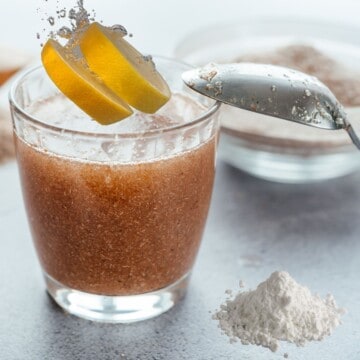
Mucoid Plaque Cleanse Recipe
Equipment
- wooden or plastic measuring spoons
- small wooden spoon
Ingredients
- 1 tablespoon organic psyllium husk
- 1 teaspoon food grade calcium bentonite clay
- 1 teaspoon freshly squeezed organic lemon juice
- 1 teaspoon organic raw honey optional
- 8 ounces filtered water
Instructions
- Mix the psyllium husk and bentonite clay together in a glass or jar.
- Add the lemon juice and honey (if using) to the mixture.
- Pour the filtered water into the glass or jar and stir well until all the ingredients are thoroughly combined.
- Let the mixture sit for 5-10 minutes to allow the psyllium husk and bentonite clay to absorb the water and form a gel-like consistency.
- Drink the mixture immediately, preferably on an empty stomach.
- Follow it with an additional 8 ounces of filtered water to ensure proper hydration.
Notes
Nutrition
Substitutions and Variations
While the mucoid plaque cleanse recipe provides a general guideline, it is essential to understand that substitutions and variations can be made based on individual preferences and dietary restrictions.
Here are some considerations for making substitutions or variations in the recipe:
Psyllium Husk Powder Substitutions
If you cannot find psyllium husk powder or prefer an alternative, other natural fiber sources can be used. Ground flaxseed or chia seeds are often used as substitutes for psyllium husk powder in cleansing recipes. Ensure they are ground into a fine powder-like consistency for better mixing.
 Viva Naturals Organic Groun...Shop on Amazon
Viva Naturals Organic Groun...Shop on Amazon
Bentonite Clay Alternatives
Bentonite clay is commonly used for its detoxifying properties. However, if you are unable to find or prefer not to use it, you can consider using other gentle detoxifying agents such as activated charcoal or diatomaceous earth.
Note that the proportions and usage instructions may vary when using alternative ingredients, so it's important to follow the specific guidelines for each substitution.
 Activated Charcoal Powder F...Shop on Amazon
Activated Charcoal Powder F...Shop on Amazon
Lemon Juice Variations
While freshly squeezed lemon juice is commonly used in the cleanse recipe, you can experiment with other citrus juices such as lime or grapefruit juice. These citrus juices offer similar alkalizing properties and may provide a different flavor profile to the cleanse.
Honey Exclusion
The addition of organic raw honey in the recipe is optional and can be omitted, especially if you prefer a sugar-free or vegan option. The honey serves to balance the taste, but the cleanse can still be effective without it.
You can use a splash of organic apple juice, date syrup, agave, or maple syrup also. For a low-calorie natural sweetener, consider pure stevia or pure monk fruit.
Remember, when making substitutions or variations, it is crucial to understand the properties and potential effects of the alternative ingredients.
Consider individual dietary needs, preferences, and any specific health conditions. If you have concerns or questions, it is advisable to consult with a healthcare professional or holistic nutrition specialist to ensure a safe and suitable adaptation of the mucoid plaque cleanse recipe.
Tailoring the recipe to your specific requirements can enhance your experience and make it more enjoyable while still supporting your digestive health goals.
Alternative Cleanse Options
If you're looking for alternative cleanse options to the mucoid plaque cleanse recipe, here are a few suggestions:
Water Fasting
Water fasting involves abstaining from solid food and consuming only water for a specific period.
This approach gives your digestive system a break and allows the body to focus on detoxification and cleansing.
However, it's important to note that water fasting should only be done under medical supervision and for a limited duration.
Juice Cleanse
A juice cleanse involves consuming fresh, nutrient-rich juices made from fruits and vegetables for a designated period.
Cold Pressed Juice can provide a wide array of vitamins, minerals, and antioxidants while giving the digestive system a rest.
However, it's crucial to use fresh, organic produce and ensure a balanced mix of juices to avoid nutrient deficiencies.
Check out our article on the detox juices of wheatgrass and barley grass.
Herbal Cleanse
Herbal cleanses utilize specific herbs and herbal preparations that are known for their detoxifying properties.
These cleanses often come in the form of herbal teas, capsules, or tinctures.
Commonly used herbs include dandelion root, milk thistle, burdock root, and ginger.
Consulting with an herbalist or healthcare professional is advisable to ensure the right selection and appropriate usage.
Colon Hydrotherapy
Colon hydrotherapy, also known as colonic irrigation, is a procedure performed by trained professionals. It involves gently flushing the colon with water to remove accumulated waste and toxins.
This method provides a thorough cleanse of the colon and may be suitable for those seeking a more comprehensive approach. It's crucial to seek a qualified practitioner and follow their guidelines for safe and effective colon hydrotherapy sessions.
Modified Diet Cleanse
Another option is to modify your diet for a specific period to support detoxification and cleansing. This can involve eliminating processed foods, refined sugars, unhealthy fats, and alcohol while focusing on whole, nutrient-dense foods.
Emphasize fresh fruits, vegetables, whole grains, lean proteins, and plenty of water to support your body's natural detoxification processes.
Personal Notes
Once you have done a cleanse, it is important to choose clean, fresh ingredients as close to nature as possible. In fact, this important lifestyle shift is a cleanse in itself.
Personally, I have enjoyed intermittent juice fasts and bentonite clay or activated charcoal supplements along with eating nutrient-dense minimally processed meals with natural ingredients.
After a while, I noticed my body stopped craving sugar and other processed foods I once enjoyed regularly.
I started to feel better and many health problems and pains faded away.
If I did choose to try something that had ingredients that were not in alignment with my new lifestyle, I have been able to notice it right away in the form of aches, pains, digestive upset, and headaches, for instance.
One analogy that explains this is that it is easier to notice a piece of trash thrown on the floor in a clean room than it is to notice a piece of trash thrown in an already messy room.
I have found this absolutely to be the case. Cleaning up my lifestyle has helped me to be more in tune with my body and notice what agrees with me and what doesn't!
Remember, before attempting any alternative cleanse options, it's important to consult with a healthcare professional or a qualified practitioner. They can provide guidance based on your individual health needs, ensure safety, and tailor the cleanse to your specific requirements. Cleansing should be approached with care and consideration for your overall well-being.
Have you done a cleanse? How has it helped you on your health journey? Let us know in the comments below! Don't forget to subscribe to our newsletter for the best up-to-date wellness info and recipes!
Happy Cleansing!
Natalie

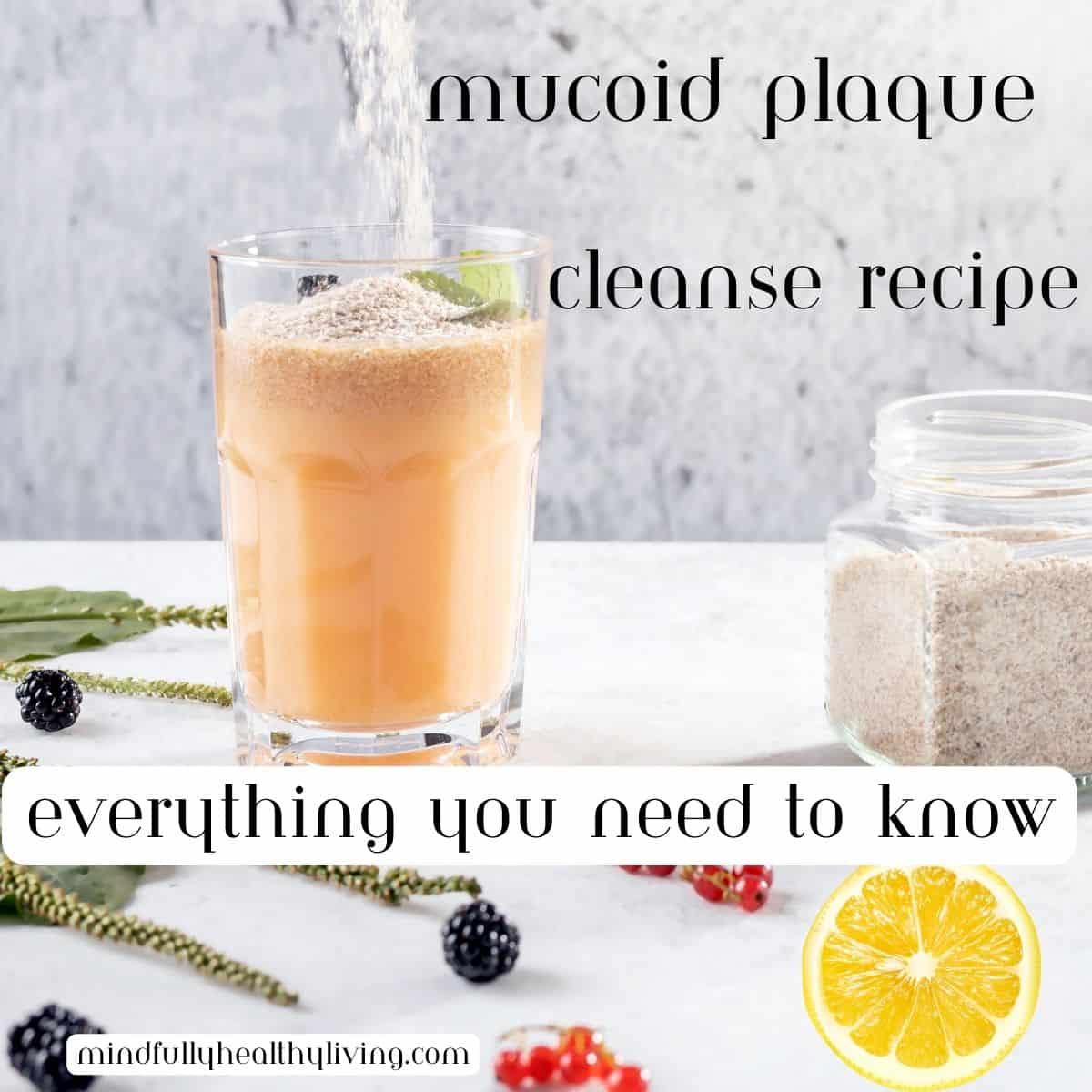
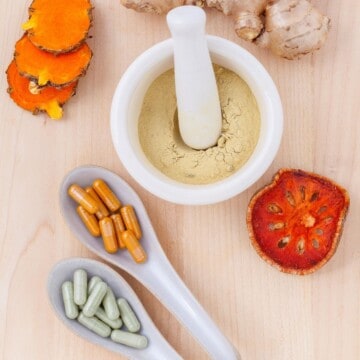




Helen at the Lazy Gastronome says
We use the store bought powder, but this is so much tastier and most likely, far better for my body!
Natalie Perry says
Psyllium husk powder?